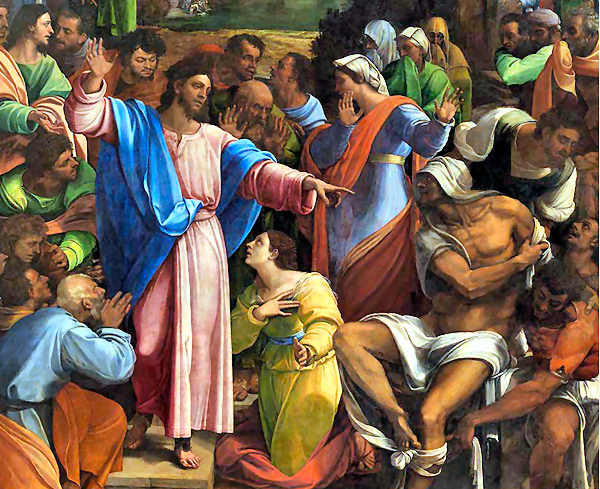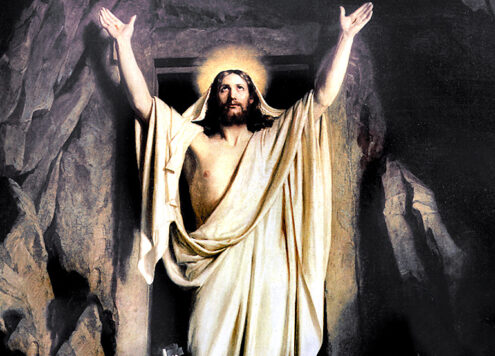“He called out in a loud voice: Lazarus, come forth.”
—Gospel of John, chapter 11:43
The story of the raising of Lazarus from the dead is a prelude to the Resurrection of Jesus Himself, an event that has changed human history and our world.
In a beautiful story from St. John’s gospel (John 11:1–45) we read that Jesus restores his “beloved” friend, Lazarus, to life. The word “beloved” is used for a purpose. It was a special term of endearment attributed by the early Christians to those who loved the Lord. Thus the story of Lazarus’ resurrection is our story as well.
This story helps us to come to a deeper faith in the power of Jesus to raise us up also.
Thus, the story develops:
Jesus is met by Martha, the sister of the deceased Lazarus. Although she has faith in Jesus, her faith is weak. She objects when Jesus asks to have the stone rolled away from the tomb. She had missed the point of Jesus’ words: “I am the resurrection and the life; whoever believes in me, though he should die, will come to life; and whoever is alive and believes in me, will never die” (John 11:25). Martha was thinking of the resurrection as something that happens after we die. She did not realize that the resurrection is something that also takes place, in the here and now, when we die to sin and rise to grace.
The words of Jesus to Martha tell us that those who are united to Jesus in faith already experience the resurrection. Our relationship to the God who transfigures us, gives us the living water of grace, bathes us in the light of faith, and rescues us from the clutches of death, is a relationship that begins now and even survives after death.
This is truly the new life which the Resurrection signifies.
The theme of new life sums up the message of today’s scripture. As human beings, we are meant for life not death. Life is our cherished goal, confined by no horizon, unclouded by no fear. Jesus offers such a life to us now and He helps us to navigate our life’s course by His teaching and example.
After a brief prayer of thanksgiving and praise to God, Jesus calls Lazarus forth from the tomb. Lazarus came out of the tomb bound tight in the garment of death, and Jesus says: “ Untie him and let him go free.” (John 11:44)
Like Lazarus, we are bound by the death-dealing powers that surround us: narrow-mindedness, long-held grudges, broken relationships, and the inability to see life’s possibilities. Today’s gospel offers us hope, it calls on us to untie one another, to free one another, and to journey together unfettered, knowing that in freedom, God walks with us.
Jesus did not say that the person who believes in Him “will” have eternal life. He says that the person who believes in Him “has” eternal life. That’s a big difference. Christians who share in Christ’s new life of the Resurrection have eternal life offered to them now. They have been born again the way St. Paul describes it: “I LIVE, NOW NOT I, BUT CHRIST LIVES IN ME” (Galatians 2:20 ).
Resurrection is more than a past event that happened to Jesus over two thousand years ago. Sure, the Resurrection of JESUS makes all good things possible for us, but what makes it really special for us, here and now, is that it is a gift that transforms our present existence in this world. The Resurrection is God’s gift to us, and it keeps on giving throughout our lives.
Like Lazarus in this gospel story, we are called to new life. This is the message Jesus preached while He walked the earth, and which He continues to impart to all of us.
He has the power to raise us up to new life if we work with His grace.
—Fr. Hugh Duffy











6 Comments
Andrew
Amen.
Kelly Weaver
Beautiful! Thank you Father. God Bless you!
Carolyn E
Profound and wise…thank you for a beautiful and perceptive explanation of the Resurrection.
Patricia Rodney
Thank you, Father!
Adventtruth
Earth’s most glorious event.
Looking for that blessed hope, and the glorious appearing of the great God and our Saviour Jesus Christ
(Titus 2:13)
http://bit.ly/1MbgNcD.
Diane Fratus
Thank you so much Father.